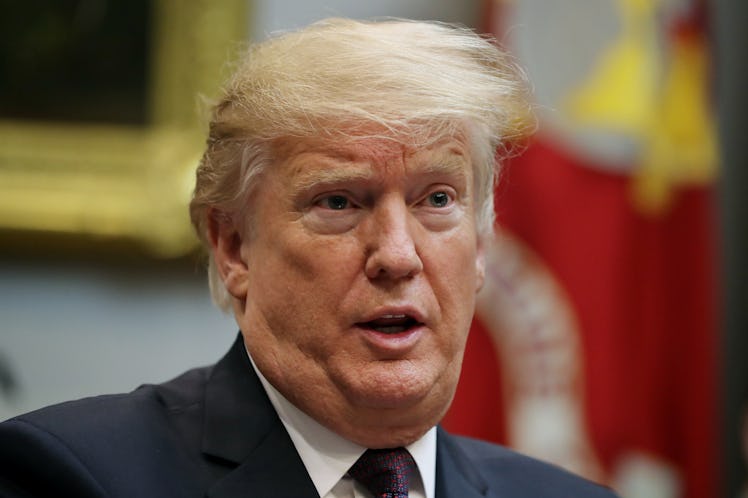
Trump Announced A Deal To End The Shutdown (For Now)
The day that you (and 800,000 others) have been waiting for is here. On Jan. 25, Donald Trump announced a deal to end the government shutdown (!!!). With airports and other government-regulated businesses descending into further chaos with each passing day of the historic partial government shutdown, it's safe to say that this has been a long time coming. So, when will the government reopen, you ask? The good news is that it won't take nearly as long as the shutdown did to pass.
Speaking to reporters at the White House on Jan. 25, President Trump said the government will reopen "immediately" now that he and political leaders have apparently reached a deal to reopen the government until Feb. 13. In those three weeks, he and Congress will negotiate on funding for a wall at the United States southern border, which he says will fix a growing "humanitarian and security crisis." The wall has been a sticking point in budget negotiations, with Democrats refusing to fund the more than $5 billion Trump requested, and the president refusing to sign a budget that did not include it. Trump said he plans on asking Senate Majority Leader Mitch McConnell to put this temporary fix "on the floor immediately." Elite Daily reached out to the White House for any additional comment, but did not hear back by the time of publication.
Despite the agreement, which did not include explicit funding for a border wall, the president doubled down on his call for the barrier at the southern border. "So let me very clear. We really have no choice but to build a powerful wall or steel barrier," declared Trump. "If we don't get a fair deal from Congress the government will either shut down on February 15th, again, or I will use the powers afforded to me under the laws and the Constitution of the United States to address this emergency." (More on those powers later.)
The update comes amid reports that the shutdown, now in its 35th day, has apparently caused some major flight disruptions across the United States due to staffing shortages. Per The Washington Post, on Jan. 25, the Federal Aviation Administration (FAA) began restricting flights into New York City's LaGuardia Airport because there weren't enough air traffic controllers to safely manage all the planes in the air. The FAA shared a statement with the Post regarding the delays saying that there have been "slight increases in sick leave at two facilities," which, despite the FAA's assertion that there have been "minimal impacts," is still a security and safety concern.
The news of flight delays prompted an outpouring of opinions, with lawmakers pleading for an end to the shutdown.
“For 35 days, the dedicated air traffic controllers who guide 43,000 flights a day and keep millions of Americans safe each year have gone to work knowing that they will not be paid,” Rep. Peter A. DeFazio (D-Oregon) pleaded. “Today marks the second time that our air traffic controllers will receive pay stubs that say zero dollars. Meanwhile, their bills are piling up and many are struggling to make ends meet.”
New York Mayor Bill de Blasio also urged the president to give up his demands for a border wall so that Americans will no longer have to suffer.
There are reportedly 800,000 federal workers who have been affected by the government shutdown, forced to work without pay. According to multiple reports, many have fallen behind on bills, turned food banks for survival, and found part-time jobs with businesses like Uber to make ends meet.
Up until this point, the president had strongly refused to reopen the government unless Congress gave him $5.7 billion for the construction of a border wall with Mexico. Democrats, however, had firmly declared they weren't willing to give up more than $1.3 billion for border fencing and barriers while urging Trump to first open the government and then debate border funding. Determined to get the funding, Trump reportedly started considering pulling funds meant for disaster aid and declaring a national emergency, which would allow him to pull money from the Department of Defense (DOD) and other sources to finance his wall, but such aggressive moves could worsen tensions between him and Congress. The White House previously did not respond to Elite Daily's request for comment on Trump's back-up options.
Great job, here. Hopefully, Trump and Congress can continue this good energy and come to a mutual and final agreement on border funding in the next three weeks. Fingers crossed.